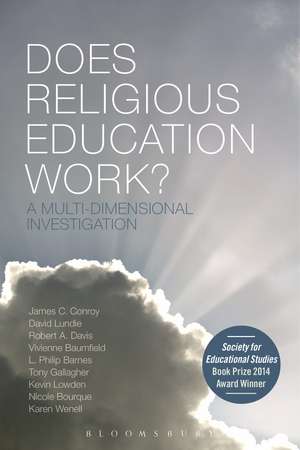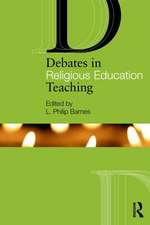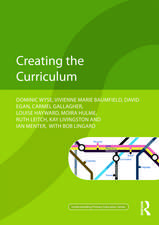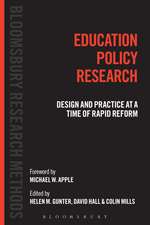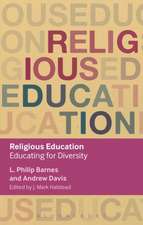Does Religious Education Work?: A Multi-dimensional Investigation
Autor Professor James C. Conroy, David Lundie, Professor Robert A. Davis, Professor Vivienne Baumfield, Dr L. Philip Barnes, Professor Tony Gallagher, Kevin Lowden, Dr Nicole Bourque, Dr Karen J. Wenellen Limba Engleză Paperback – 22 apr 2015
| Toate formatele și edițiile | Preț | Express |
|---|---|---|
| Paperback (1) | 251.57 lei 6-8 săpt. | |
| Bloomsbury Publishing – 22 apr 2015 | 251.57 lei 6-8 săpt. | |
| Hardback (1) | 891.51 lei 6-8 săpt. | |
| Bloomsbury Publishing – 23 oct 2013 | 891.51 lei 6-8 săpt. |
Preț: 251.57 lei
Preț vechi: 288.20 lei
-13% Nou
Puncte Express: 377
Preț estimativ în valută:
48.14€ • 51.48$ • 40.14£
48.14€ • 51.48$ • 40.14£
Carte tipărită la comandă
Livrare economică 17 aprilie-01 mai
Preluare comenzi: 021 569.72.76
Specificații
ISBN-13: 9781474234658
ISBN-10: 1474234658
Pagini: 280
Ilustrații: black & white illustrations
Dimensiuni: 156 x 234 x 15 mm
Greutate: 0.4 kg
Editura: Bloomsbury Publishing
Colecția Bloomsbury Academic
Locul publicării:London, United Kingdom
ISBN-10: 1474234658
Pagini: 280
Ilustrații: black & white illustrations
Dimensiuni: 156 x 234 x 15 mm
Greutate: 0.4 kg
Editura: Bloomsbury Publishing
Colecția Bloomsbury Academic
Locul publicării:London, United Kingdom
Caracteristici
Draws on the rich ethnographic data of a three-year AHRC/ESRC-funded research project
Notă biografică
James C. Conroy is Vice-Principal (Internationalisation) and Professor of Religious and Philosophical Education at the University of Glasgow, UK.David Lundie is Senior Lecturer in Education at Liverpool Hope University, UK.Robert A. Davis is Professor of Religious and Cultural Education and Head of the School of Education at the University of Glasgow, UK.Vivienne Baumfield is Professor of Pedagogy, Policy and Innovation at the University of Glasgow, UK.L. Philip Barnes is Emeritus Reader in Religious and Theological Education at King's College London, UK.Tony Gallagher is Professor of Education and Pro-Vice Chancellor at Queen's University Belfast, UK, where he was previously Head of the School of Education. Kevin Lowden is Research Fellow at the Scottish Council for Research in Education (SCRE) Centre, University of Glasgow, UK.Nicole Bourque is Senior Lecturer in Social Anthropology at the University of Glasgow, UK.Karen Wenell is Lecturer in New Testament and Theology at the University of Birmingham, UK.
Cuprins
AcknowledgementsIntroductionPart I: Methodological and Structural Questions1. Methodological Considerations: Learning from the Inside2. The Strange Position of Education in Religion in Contemporary Political Culture3. The Complexities of UK Policy and Practice4. Conceptual Questions, Confusions and ChallengesPart II: The Substance of Religious Education5. Citizenship and Committed Pluralism: The Place of the 'other' in RE's Social and Civic Aims6. Religious Education and the Nature of Texts7. Stories We Tell Ourselves: Making Sense of Religious Education in Communities of Practice8. Religious Education and Student PerspectivesConclusions: Imagining and re-Imagining Religious EducationAppendicesIndex
Recenzii
A salutary and timely reminder to us of the crucial significance of the value of RE in the UK curriculum ... [This book] represents the latest thinking on the subject.
This book offers thought-provoking reflections on religious education as found in classroom practice with year 10 (16+) students across England, Scotland and Northern Ireland. It presents challenging insights into the varied aspirations of teachers and the perceptions of pupils.
Does Religious Education Work? is, in the words of its authors, an attempt to unearth the nooks and crannies of the curriculum oddity known popularly as 'RE'. Odd because it is more fraught with religious politics than good and unabashed pedagogical theory and practice, this book is timely in its frank, bold and necessarily non-privileging appraisal of the subject as it truly functions, rather than as the politics says it should. The method applied by this polymath team of educationists, theologians, anthropologists and psychologists renders this unearthing a veritable peeling away of all the myths and pretensions heaped on RE by its attached politics. While focussed entirely on the UK experience, it has universal application and is arguably the most thorough peeling away conducted anywhere in the English-speaking world, if not beyond it.
This collection of essays in quite an imaginative way foregrounds the smooth and striated pedagogical spaces associated with rhizomatic epistemological inquiry in relation to religious education in contemporary British society. It puts into systematic controversy some of the taken-for-granted notions of religious education and troubles through pragmatic analyses some of the utopias and dystopias of current religious education discourse. For once, religious education is being reconsidered in a critically ontological way that suspends a rush to judgement about the discourse in modern times
Religious education in the UK school setting could have and should have a real impact on students' personhood formation and is a necessity in a world characterized by religious pluralism. This is the robust, normative, loaded and sophisticated conclusion of the authors, based on solid conceptual analysis combined with insightful ethnographic empirical research and using the Delphi method. The presented results provide food for reflection for professionals, academics, and last but not least, for UK politicians who are not interested in a simple 'yes' or 'no' in answering the question that forms the title of this book. It provides food for thought that might help to better shape religious education in the future and to deal with indeed existing dysfunctional elements in current religious education practices.
I feel better equipped ... having read this book.
This book offers thought-provoking reflections on religious education as found in classroom practice with year 10 (16+) students across England, Scotland and Northern Ireland. It presents challenging insights into the varied aspirations of teachers and the perceptions of pupils.
Does Religious Education Work? is, in the words of its authors, an attempt to unearth the nooks and crannies of the curriculum oddity known popularly as 'RE'. Odd because it is more fraught with religious politics than good and unabashed pedagogical theory and practice, this book is timely in its frank, bold and necessarily non-privileging appraisal of the subject as it truly functions, rather than as the politics says it should. The method applied by this polymath team of educationists, theologians, anthropologists and psychologists renders this unearthing a veritable peeling away of all the myths and pretensions heaped on RE by its attached politics. While focussed entirely on the UK experience, it has universal application and is arguably the most thorough peeling away conducted anywhere in the English-speaking world, if not beyond it.
This collection of essays in quite an imaginative way foregrounds the smooth and striated pedagogical spaces associated with rhizomatic epistemological inquiry in relation to religious education in contemporary British society. It puts into systematic controversy some of the taken-for-granted notions of religious education and troubles through pragmatic analyses some of the utopias and dystopias of current religious education discourse. For once, religious education is being reconsidered in a critically ontological way that suspends a rush to judgement about the discourse in modern times
Religious education in the UK school setting could have and should have a real impact on students' personhood formation and is a necessity in a world characterized by religious pluralism. This is the robust, normative, loaded and sophisticated conclusion of the authors, based on solid conceptual analysis combined with insightful ethnographic empirical research and using the Delphi method. The presented results provide food for reflection for professionals, academics, and last but not least, for UK politicians who are not interested in a simple 'yes' or 'no' in answering the question that forms the title of this book. It provides food for thought that might help to better shape religious education in the future and to deal with indeed existing dysfunctional elements in current religious education practices.
I feel better equipped ... having read this book.
